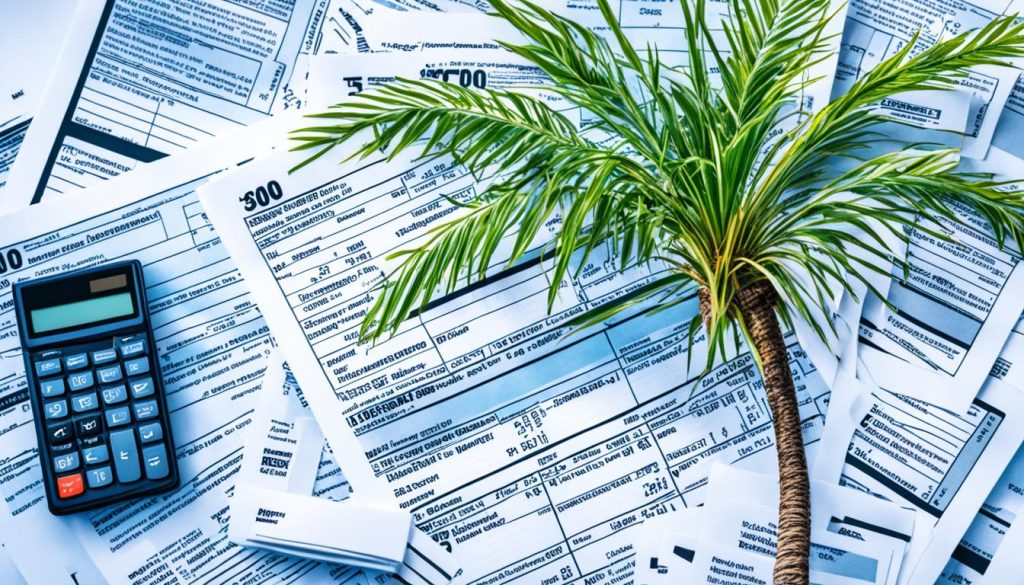Over 59 million Americans now work for themselves, making up a big part of the U.S. workforce. For freelancers and digital nomads in Florida, dealing with taxes might seem tough. But this tax guide will make things clearer. It’ll show you what you need to do and how to pay less in taxes.
The tax guide for freelancers in Florida dives into important topics. It talks about how to handle self-employment taxes, which expenses you can claim, and how to pay taxes ahead of time. It also explains how to tell the government about your income. It’s useful for anyone working independently, from writers to developers.
This guide will teach you about self-employment tax. It will also show you how to claim more deductions to lower your tax bill. You’ll learn why making estimated tax payments and reporting your income correctly are so crucial. These steps can prevent you from facing fines and will keep your finances stable.
If you’re just starting out in the gig economy or have been working remotely for a while, this guide is for you. It’s your one-stop source for sorting out tax issues in Florida. With its help, you can make tax planning easier and worry less about your financial future.
Understanding Tax Obligations for Digital Nomads
Being a digital nomad brings unique tax issues. You might need to deal with taxes in more than one country. Normally, you’d pay taxes where you live or where you spend most of your time. But, you might also have to deal with taxes in other places.
Figuring out where you’re a tax resident can be hard. Things like the 183-day rule and the tax residency fallback principle make it complicated. You could be seen as a tax resident in more than one place. Each country has its own rules for digital nomads.
It’s important to understand how digital nomad taxes work. This helps you manage your money and live well as a digital nomad. Always make sure you’re following the tax rules. This way, you lower your tax burden and enjoy life on the move.
| Tax Obligation | Description | Potential Implications |
|---|---|---|
| Tax Residency | Figuring out your tax residency can be tough for digital nomads. It may depend on how long you stayed in a country, where your home is, and your ties to a place. | Your tax resident status decides where you pay taxes and file tax returns. |
| Income Reporting | Digital nomads have to report income they make in different countries. This means they might have to pay taxes in many places. | Not reporting income correctly can lead to fines and legal trouble. So, know your reporting duties well. |
| Asset Disclosure | You might need to tell about foreign assets and accounts. This often means using forms like FBAR and FATCA. | Not telling about your assets right can cause big problems. Be sure you understand the rules. |
It’s smart to keep up with tax residency rules and digital nomad tax obligations. This helps you handle taxes better and lowers your tax bill.
Establishing Tax Residency in Florida
As a digital nomad or freelancer, picking the right tax residency is vital. Florida stands out as it’s a tax-friendly state for digital nomads. Choosing tax residency in Florida can help you dodge state income taxes and keep more money in your pocket annually.
To make Florida your domicile, you need to show it’s where you primarily live and plan to return. This means showing strong personal and financial ties, like having a base, bank accounts, being on the voter list, and holding a local driver’s license.
Florida is attractive to digital nomads and freelancers because of its lack of state income tax. With smart tax residency planning, you could save a big chunk of your yearly earnings, between 5-20%.
| Benefit | Description |
|---|---|
| No State Income Tax | Florida doesn’t tax your income, which is a big draw for those freelancing or wandering online. |
| Lower Cost of Living | The cost of living in Florida is often cheaper than elsewhere, meaning more money for you. |
| Flexible Residency Requirements | Making Florida your tax home is quite simple, needing only a 183-day stay without the need to buy property. |
| Favorable Business Climate | Florida welcomes freelancers and digital business owners with open arms because of its business-friendly climate. |
Are you a freelancer looking for the best workspace in Florida? Schedule a virtual tour here.
Plan your tax residency with care and you could enjoy great savings in Florida. Talk to a tax pro to set up your tax residency in Florida correctly. This will help you make the most of tax advantages as a freelancer or digital nomad.
Self-Employment Taxes for Freelancers
If you work for yourself, learn about self-employment taxes. These include Social Security and Medicare taxes. But instead of your boss paying a part, you pay it all. This can be a big chunk of your money.
Right now, this self-employment tax is at 15.3%. 12.4% helps with Social Security, and 2.9% goes to Medicare. Remember, you calculate this tax on your income minus your business expenses. Try to keep money aside for this so you’re ready when it’s time to pay.
That’s not all. You also owe federal income tax. It’s a bit tricky because you need to guess how much you’ll owe and pay it every few months. By keeping up with these taxes, you avoid getting in trouble with the IRS. This way, you keep your finances in good shape.

Tax Guide for Freelancers
Being a freelancer in Florida means dealing with many tax rules. This tax guide for freelancers will help you understand taxes better. It offers tips to pay less in taxes and follow all the rules.
First, let’s look at freelancer tax deductions. You can deduct many costs, from your home office to your car expenses. Knowing these deductions can lower how much you pay in taxes each year.
It’s also key to pay your estimated tax payments for freelancers on time. Since you work for yourself, the IRS expects you to pay estimated taxes every quarter. Doing this can prevent you from paying extra penalties.
Next, you need to report your freelance income correctly. The guide helps you keep track of your earnings. With the right paperwork, you can file your taxes accurately and on time.
By using the advice in this comprehensive tax guide for freelancers, you’ll feel more at ease with Florida’s tax rules. This guide is useful for freelancers at any stage. It shows you how to be organized, follow the law, and save money on taxes.
Deductions and Credits for Digital Nomads
If you’re a digital nomad, you might get tax breaks that lower the amount you owe. Key benefits include the foreign earned income exclusion (FEIE), foreign tax credit (FTC), and the foreign housing exclusion (FHE).
The FEIE lets you not pay tax on some overseas-earned money, up to a limit. This is great if you work a lot outside the US. The FTC helps by letting you decrease what you owe for US tax through credits from foreign taxes. The FHE also cuts your tax bill by not counting some foreign housing costs as income.
Digital nomads might also get general tax deductions. These can be for home office costs, work trips, or growing professional skills. Such tax credits really help manage what you owe and boost your finances.
It’s key to check if you can use these deductions and credits. The rules might be tough to understand on your own. A tax pro who knows about taxes for digital nomads can guide you. They’ll make sure you use all chances to save on taxes.
Reporting Foreign Assets and Income
If you’re a digital nomad, understanding reporting rules for your foreign money is key. You should know about the FBAR and Form 8938. The FBAR stands for Report of Foreign Bank and Financial Accounts. On the other hand, Form 8938 is about your specified foreign financial assets.
If you own or control certain foreign financial accounts, like banks or stocks, you need an FBAR. This is if their total value is above $10,000 in a year. Not filing an FBAR can lead to big fines.
Form 8938 is required by the Foreign Account Tax Compliance Act for certain foreign assets. The amount needed to file varies by where you live and your filing status. Make sure to check if you need to file this form.
| Form | Reporting Requirement | Threshold |
|---|---|---|
| FBAR | Report of Foreign Bank and Financial Accounts | Total value of foreign financial accounts exceeding $10,000 at any time during the calendar year |
| Form 8938 | Statement of Specified Foreign Financial Assets | Varies based on filing status and residency |
Not doing the right paperwork for your foreign money can lead to big trouble. It’s vital to check your situation. And talk to a tax pro to make sure you’re following all the rules.
State Tax Considerations
For digital nomads and freelancers, dealing with state taxes is a big deal. It’s key to pick the right state to live in for lower taxes. Florida is a top pick thanks to no state income tax, but there’s more to know about state taxes for digital nomads.
Living in certain states, known as “sticky states,” can lead to higher taxes. These states might tax you more, even if you haven’t been there much. To avoid extra taxes, you must show where you really live and cut ties with your old state. This way, you dodge the “stickiness” of these states.
| State | Tax Residency Requirements | Tax-Friendly for Digital Nomads? |
|---|---|---|
| Florida | Establish permanent home, file a Declaration of Domicile, and spend at least 183 days per year in the state. | Yes, with no state income tax. |
| Texas | Maintain a permanent home, spend the majority of the year in the state, and file a Texas Resident Income Tax Return. | Yes, with no state income tax. |
| Nevada | Establish a permanent residence, spend the majority of the year in the state, and file a Nevada Resident Income Tax Return. | Yes, with no state income tax. |
Learning about establishing state tax residency and following the rules in tax-friendly states for digital nomads helps you lessen your taxes. This could save you a lot of money.
Tax Planning Strategies
As a digital nomad or freelancer, proactive tax planning is key to lower your tax bill. By using strategic tax planning, you can increase your tax savings. It ensures you use all deductions and credits. Here are some crucial tax planning steps to consider:
1. Maximizing tax deductions and credits: Keep a close eye on your business expenses. This includes costs for travel, equipment, and software. Make sure to claim all deductions you’re eligible for. Also, check for tax credits like the foreign earned income exclusion (FEIE) or foreign tax credit (FTC).
2. Optimizing income timing and allocation: Timing your income and deductions can lower your taxes. You may want to delay income or speed up deductions. This can help decrease your taxable income for the year.
3. Leveraging tax-advantaged accounts: Think about putting money into retirement accounts. This can include a self-employed 401(k) or a Simplified Employee Pension (SEP) IRA. Doing this can cut your taxes and increase your eligible deductions and credits.
4. Exploring state tax planning: Digital nomads can often choose where to make their tax home. States like Florida, with no income tax, could be a good option. Be sure to look at your state tax situation. You might find ways to lower your tax bill.
5. Seeking professional tax guidance: Figuring out your tax obligations as a digital nomad can be complex. That’s why it’s smart to get help from a tax expert. They can offer tips and tricks to make your taxes as low as possible.
By following these tax planning tips, you can cut your tax bill. Make sure to stay updated and work with tax experts. They’ll help you take full advantage of the tax breaks available to digital nomads and freelancers.
Resources for Digital Nomad Taxation
Filing taxes as a digital nomad might seem hard at first. But, there are great resources to help. They make sure you follow tax rules and find chances to save.
A smart move is to team up with an expert tax professional. These folks know all about tax laws for digital nomads. They’ll give advice that fits your specific tax situation. This helps cut down how much tax you owe.
| Resource | Description |
|---|---|
| Kiplinger | A trusted source for personal finance and tax info. It has lots of tips for digital nomads. And it helps with planning taxes. |
| IRS Publication 17 | The IRS provides a big guide on taxes. It’s key for anyone working remotely. The guide covers important tax info. |
| Nomad Tax | This service is all about helping digital nomads with their taxes. They offer expert advice and resources for tax planning. |
With these tools and expert advice, tackling tax challenges becomes easier. Working with experts in digital nomad taxes is a smart move. They help you use tax laws to lower your tax bill.

Tax Challenges for Digital Nomads
Digital nomads face many tax challenges while living and working in different countries. One main issue they encounter is determining their tax residency. Since they live in various places, figuring out where to pay taxes is hard.
Evidence shows that handling reporting foreign income and assets is tough. Digital nomads earn from different places, locally and abroad. They must be careful to report all their income correctly. Missing this can lead to fines and legal trouble.
For digital nomads, managing self-employment taxes is another difficulty. They handle their own taxes, which include Social Security and Medicare. Keeping up with these tax responsibilities is complex.
| Tax Challenge | Description |
|---|---|
| Tax Residency Issues | Digital nomads often struggle to establish a clear tax residency, as they may spend significant time in multiple locations, making it difficult to determine where they should pay taxes. |
| Reporting Foreign Income and Assets | Digital nomads who earn income from multiple sources, both domestic and international, must be diligent in accurately reporting all income to the appropriate tax authorities. |
| Managing Self-Employment Taxes | As independent contractors or freelancers, digital nomads are responsible for paying self-employment tax (SECA tax), which includes both the employer and employee portions of Social Security and Medicare taxes. |
To tackle these tax residency issues for digital nomads, reporting foreign income and assets, and managing self-employment taxes, understanding is key. It’s important for digital nomads to get advice from tax experts familiar with their situation. Professionals can help them comply and cut their tax cost.
Conclusion
Exploring taxes as a freelancer or digital nomad in Florida might seem hard. But, with the right info and planning, you can pay fewer taxes and enjoy more of your life.
The important points from this guide are finding the best place for tax residency, knowing how self-employment taxes work, using deductions and credits to your advantage, and keeping careful tax records. By learning and getting help from professionals, you’ll meet all tax requirements and find more financial freedom.
Tax planning for freelancers and digital nomads needs continuous watchfulness and the ability to change. As you move around or your job changes, you must keep your tax strategy updated. Using the tools and advice from this guide, you’ll stay on top of your taxes and do well in Florida as a freelancer or digital nomad.


